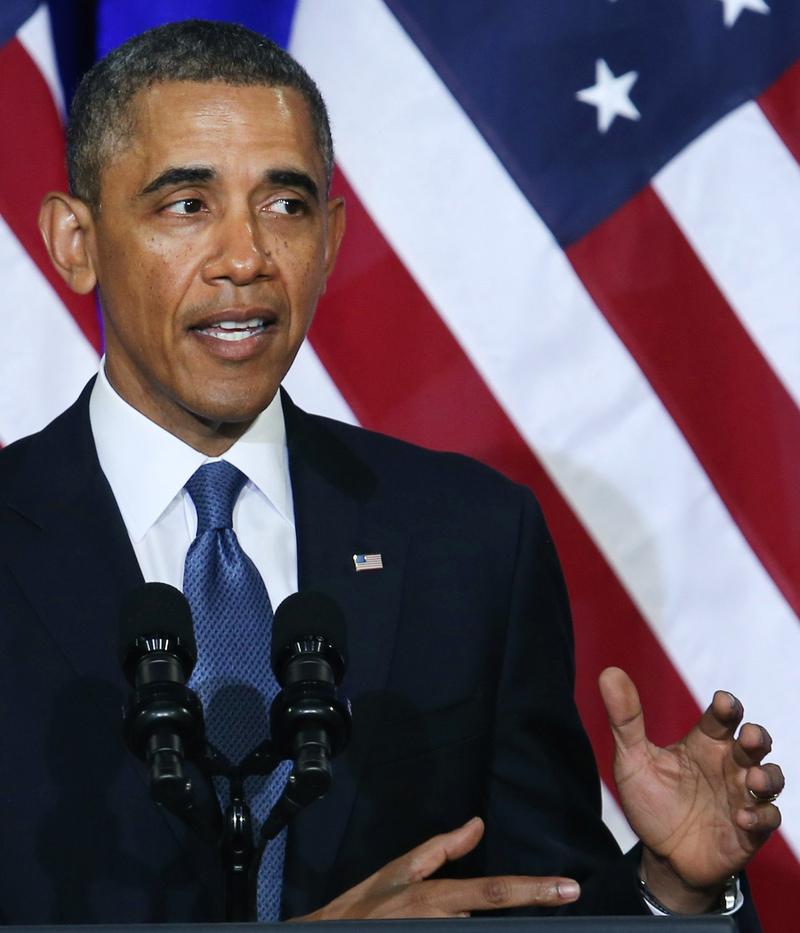BROOKE GLADSTONE: From WNYC in New York, this is On the Media. I'm Brooke Gladstone.
BOB GARFIELD: And I’m Bob Garfield. On Friday, the President decided he had some ‘splainin’ to do, like why after September 11th US intelligence began to supersize.
[INTERMITTENT CLIPS]:
PRESIDENT BARACK OBAMA: We were shaken by the signs we had missed leading up to the attacks, how the hijackers had made phone calls to known extremists and traveled to suspicious places. So we demanded that our intelligence community improve its capabilities.
BOB GARFIELD: And they did, he said. Our expanding ability to penetrate digital communications has enabled us to track and unravel terrorist plots and repel cyber-attacks on our government, our banks and our grids. But he also said that he, like the rest of us, found all the data mining, including our data, quote, “disquieting.” So when he became president, he ordered a review of those programs.
PRESIDENT OBAMA: And nothing that I’ve learned since indicated that our intelligence community has sought to violate the law or is cavalier about the civil liberties of their fellow citizens.
BOB GARFIELD: Nevertheless he said he gets it.
PRESIDENT OBAMA: It is not enough for leaders to say, trust ue, we won’t abuse the data we collect, for history has too many examples when that trust has been breached.
BOB GARFIELD: We need safeguards, he said, so with regard to the NSA's bulk collection of telephone records, he agreed with an outside panel that the NSA no longer hold that information; it should stay with the telecommunications companies or a third party. But, he said, the NSA still must be able to access and analyze it. That’s a difficult needle to thread.
Likewise, the President will end the lifelong gag order on National Security Letters, which secretly request information, but he rejected his panel's recommendation that National Security Letters be issued only with a court order. He’ll increase some oversight of the FISA Court but, rebuffing the panel again, he will not put a public advocate inside. And we won't spy so much on Angela Merkel or other foreign heads of state, though, you know, everyone does it.
PRESIDENT OBAMA: It may seem sometimes that America is being held to a different standard. And I’ll admit, the readiness of some to assume the worst motives by our government can be frustrating. No one expects China to have an open debate about their surveillance programs or Russia to take privacy concerns of citizens in other places into account.
[END CLIPS]
BROOKE GLADSTONE: That might be taken as a little dig at former NSA contractor and super leaker Edward Snowden, now holed up in Moscow, who once said that he sought refuge in Hong Kong because of its spirited commitment to free speech. His revelations about the NSA sparked the current debate.
[CLIP]:
EDWARD SNOWDEN: Hi, and Merry Christmas.
BROOKE GLADSTONE: Here’s his Christmas message.
EDWARD SNOWDEN: Recently we learned that our governments, working in concert, have created a system of worldwide mass surveillance, watching everything we do.
[END CLIP]
BROOKE GLADSTONE: He learned us, not just about the NSA's domestic surveillance but it's foreign spying. In fact, just this week, the New York Times reported on a secret technology that allows the NSA to alter computers from miles away, even if they aren’t connected to the Internet, an impressive weapon in our cyber arsenal. At least it was when it was secret. The Times had held that information since 2012, at the request of American intelligence agencies. But then it was published Der Spiegel, gleaned from Snowden's documents, so the Times published too. How you feel about that probably determines how you feel about Snowden and about the need for intelligence gathering, in general.
[CLIP]:
PRESIDENT OBAMA: If any individual who objects to government policy can take it into their own hands to publicly disclose classified information, then we will not be able to keep our people safe or conduct foreign policy.
[END CLIP]
BROOKE GLADSTONE: Nevertheless, the President was prompted to pull back, and maybe even yield little power of his own free will. Has any other president done that? Has any other president even conceded that it would be in the nation’s interest to do so? Maybe Eisenhower, on another historic January 17th, back in 1961.
[CLIP]:
PRESIDENT DWIGHT D. EISENHOWER: We must guard against the acquisition of unwarranted influence, whether sought or unsought, by the military industrial complex. The potential for the disastrous rise of misplaced power exists and will persist.
[END CLIP]
BROOKE GLADSTONE: That was Eisenhower’s farewell address. The military industrial complex ballooned. But this president still has time left to, as Bob said, “thread that needle,” if the Congress and the public really want him to.
